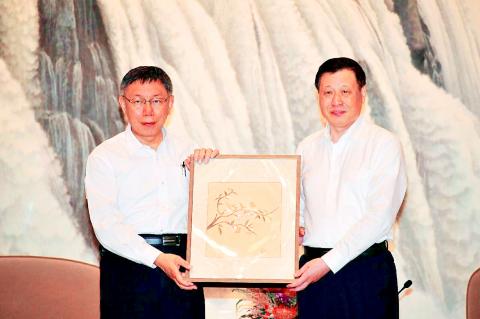The “two sides of the [Taiwan] Strait are one family,” Taipei Mayor Ko Wen-je (柯文哲) reiterated yesterday at the opening ceremony of the Taipei-Shanghai twin-city forum, the third time he has used the phrase in Shanghai, while Shanghai Mayor Ying Yong (應勇) said that “the compatriots of both sides of the Strait are family members that wish each other well and love each other.”
“We have always held on to the belief that both sides of the Strait are one family,” Ying added.
Ko used the phrase, which has been criticized by pro-independence and other pan-green supporters, for the first time in his speech to the 2015 twin-city forum, and again at the 2017 forum.

Photo courtesy of the Taipei City Government
In his speech yesterday, the Taipei mayor noted that it was the 10th year the forum has been held and 33 memorandums of understanding have been signed, on a wide variety of issues, during the forums.
The original goal of the forum was for people on both sides of the Strait to have more chances to communicate with one another, to enhance goodwill toward each other and move toward positive cross-strait relations, he said.
“There should be continuity in the exchanges between both, and policies should have stability. We should respect the agreements that were signed and the history of our interactions,” Ko said.
“We should continue to push peaceful development of the two sides of the Strait on the existing political foundation, and together pursue a better future for the people of the two sides,” he said.
He has always believed that “an attitude of mutual trust” and the concept of “two sides of the Strait are one family” can help promote exchanges and enhance goodwill on both sides, he said.
Repeating his “five mutual principles” as his approach to enhance the well-being of people on both sides, Ko also he wanted to push for exchanges so that “everyone can get along with each other peacefully and for the people to live a better life, because after all, a peaceful development for both sides is a common wish.”
Asked by Taiwanese reporters after the ceremony to explain his “one family” idea, Ko said that “it is an expression of attitude, meaning ‘we will be friendly to your people, but we want you to be friendly to Taiwanese’” in return.
The Chinese-language China Times yesterday reported that Ko told Shanghai government officials, who greeted him at the airport on Wednesday, that Chinese government officials wanting to visit Taipei face many obstacles, which is an unhealthy situation for which he does not yet have a solution.
Later in the day the National Immigration Agency released a statement saying that the 94.57 percent of applications to visit Taiwan submitted by Chinese officials and professionals in the first five months of the year had been approved, and the approval rate last year was 94.46 percent, so the government was not making it difficult for Chinese officials to visit.
Additional reporting by CNA

A preclearance service to facilitate entry for people traveling to select airports in Japan would be available from Thursday next week to Feb. 25 at Taiwan Taoyuan International Airport, Taoyuan International Airport Corp (TIAC) said on Tuesday. The service was first made available to Taiwanese travelers throughout the winter vacation of 2024 and during the Lunar New Year holiday. In addition to flights to the Japanese cities of Hakodate, Asahikawa, Akita, Sendai, Niigata, Okayama, Takamatsu, Kumamoto and Kagoshima, the service would be available to travelers to Kobe and Oita. The service can be accessed by passengers of 15 flight routes operated by

MORE FALL: An investigation into one of Xi’s key cronies, part of a broader ‘anti-corruption’ drive, indicates that he might have a deep distrust in the military, an expert said China’s latest military purge underscores systemic risks in its shift from collective leadership to sole rule under Chinese President Xi Jinping (習近平), and could disrupt its chain of command and military capabilities, a national security official said yesterday. If decisionmaking within the Chinese Communist Party has become “irrational” under one-man rule, the Taiwan Strait and the regional situation must be approached with extreme caution, given unforeseen risks, they added. The anonymous official made the remarks as China’s Central Military Commission Vice Chairman Zhang Youxia (張又俠) and Joint Staff Department Chief of Staff Liu Zhenli (劉振立) were reportedly being investigated for suspected “serious

ENHANCING EFFICIENCY: The apron can accommodate 16 airplanes overnight at Taoyuan airport while work on the third runway continues, the transport minister said A new temporary overnight parking apron at Taiwan Taoyuan International Airport is to start operating on Friday next week to boost operational efficiency while the third runway is being constructed, the Ministry of Transportation and Communications said yesterday. The apron — one of the crucial projects in the construction of the third runway — can accommodate 16 aircraft overnight at the nation’s largest international airport, Minister of Transportation and Communications Chen Shih-kai (陳世凱) told reporters while inspecting the new facility yesterday morning. Aside from providing the airport operator with greater flexibility in aircraft parking during the third runway construction,

American climber Alex Honnold is to attempt a free climb of Taipei 101 today at 9am, with traffic closures around the skyscraper. To accommodate the climb attempt and filming, the Taipei Department of Transportation said traffic controls would be enforced around the Taipei 101 area. If weather conditions delay the climb, the restrictions would be pushed back to tomorrow. Traffic controls would be in place today from 7am to 11am around the Taipei 101 area, the department said. Songzhi Road would be fully closed in both directions between Songlian Road and Xinyi Road Sec 5, it said, adding that bidirectional traffic controls would